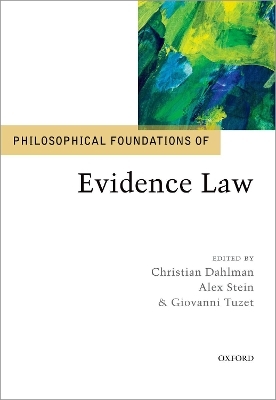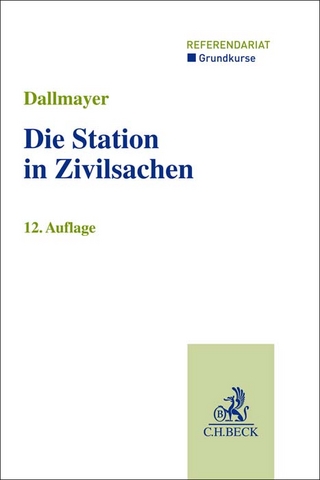
Philosophical Foundations of Evidence Law
Oxford University Press (Verlag)
978-0-19-885930-7 (ISBN)
Philosophy has a strong presence in evidence law and the nature of evidence is a highly debated topic in both general and social epistemology; legal theorists working in the evidence law area draw on different underlying philosophical theories of knowledge, inference and probability. Core evidentiary concepts and principles, such as the presumption of innocence, standards of proof, and others, reply on moral and political philosophy for their understanding and interpretation.
Written by leading scholars across the globe, this volume brings together philosophical debates on the nature and function of evidence, proof, and law of evidence. It presents a cross-disciplinary overview of central issues in the theory and methodology of legal evidence and covers a wide range of contemporary debates on topics such as truth, proof, economics, gender, and race.
The volume covers different theoretical approaches to legal evidence, including the Bayesian approach, scenario theory and inference to the best explanation.
Divided in to five parts, Philosophical Foundations of Evidence Law, covers different theoretical approaches to legal evidence, including the Bayesian approach, scenario theory and inference to the best explanation.
Christian Dahlman is Professor of Jurisprudence at Lund University (Sweden) and holds the Samuel Pufendorf chair at the Faculty of Law. He has a PhD in philosophy of law from Lund University and his academic career includes a research fellowship at Cambridge University. His main area of research is the theory and methodology of legal evidence. He is the director of the cross-disciplinary research group LEVIC (Law, Evidence and Cognition) at Lund University. Alex Stein is a Justice of the Israel Supreme Court. He holds a Ph.D. in law from the University of London. Prior to his appointment to the bench, he served as a Professor of Law at the Hebrew University, Cardozo Law School and Brooklyn Law School and as a Visiting Professor of Law at Columbia, Harvard and Yale law schools, among others. His areas of research include Evidence, Legal Theory, and Economic Analysis of Law. Giovanni Tuzet is Professor of Philosophy of Law at Bocconi University in Milan (Italy). He studied law and philosophy in Turin and Paris and wrote his Ph.D. dissertation on C.S. Peirce's theory of inference. Before joining Bocconi University, he was a post-doctoral researcher at Lausanne (Switzerland) and Ferrara (Italy). His areas of interest include evidence, epistemology, pragmatism, argumentation theory, philosophy of law and economic analysis of law.
Evidence, truth and knowledge
1: Hock Lai Ho: Evidence and truth
2: Gabriel Broughton, Brian Leiter: The Naturalized epistemology approach to evidence
3: Jordi Ferrer Beltrán: Proven facts, beliefs and reasoned verdicts
4: Lena Wahlberg, Christian Dahlman: The role of the expert witness
Law and factfinding
5: Frederick Schauer: The role of rules in the law of evidence
6: Jules Holroyd, Federico Picinali: Excluding evidence for integrity's sake
7: Alex Stein: Second-personal evidence
8: Mark Spottswood: Burdens of proof
9: Dale Nance: Weight of evidence
10: Talia Fisher: Cost-benefit analysis of fact-finding
Evidence, language and argumentation
11: Lawrence Solan: Linguistic evidentials and the law of hearsay
12: Giovanni Tuzet: The pragmatics of evidence discourse
13: Floris Bex: Argumentation and evidence
Evidence and explanation
14: Ronald Allen, Michael Pardo: Inference to the best explanation, relative plausibility and probability
15: Anne Ruth Mackor, Peter van Koppen: The scenario theory about evidence in criminal law
16: Amalia Amaya: Coherence in legal evidence
Evidence and probability
17: Franco Taroni, Alex Biedermann, Silvia Bozza: The logic of inference and decision for scientific evidence
18: Norman Fenton, David Lagnado: Bayesianism: objections and rebuttals
19: Christian Dahlman, Eivind Kolflaath: The problem of the prior in criminal trials
20: Michael Pardo, Ronald Allen: Generalizations and reference classes
Proof paradoxes
21: Mark Spottswood: Paradoxes of proof
22: Christian Dahlman, Amit Pundik: The problem of naked statistical evidence
Biases and epistemic injustice
23: Justin Sevier: Evidence law and empirical psychology
24: Julia Simon-Kerr: Relevance through a feminist lens
25: Jasmine Gonzales Rose: Race, evidence and epistemic injustice
26: Frank Zenker: De-biasing legal fact-finders
| Erscheinungsdatum | 27.10.2021 |
|---|---|
| Reihe/Serie | Philosophical Foundations of Law |
| Verlagsort | Oxford |
| Sprache | englisch |
| Maße | 180 x 253 mm |
| Gewicht | 900 g |
| Themenwelt | Recht / Steuern ► Allgemeines / Lexika |
| Recht / Steuern ► EU / Internationales Recht | |
| Recht / Steuern ► Privatrecht / Bürgerliches Recht ► Zivilverfahrensrecht | |
| ISBN-10 | 0-19-885930-9 / 0198859309 |
| ISBN-13 | 978-0-19-885930-7 / 9780198859307 |
| Zustand | Neuware |
| Informationen gemäß Produktsicherheitsverordnung (GPSR) | |
| Haben Sie eine Frage zum Produkt? |
aus dem Bereich


